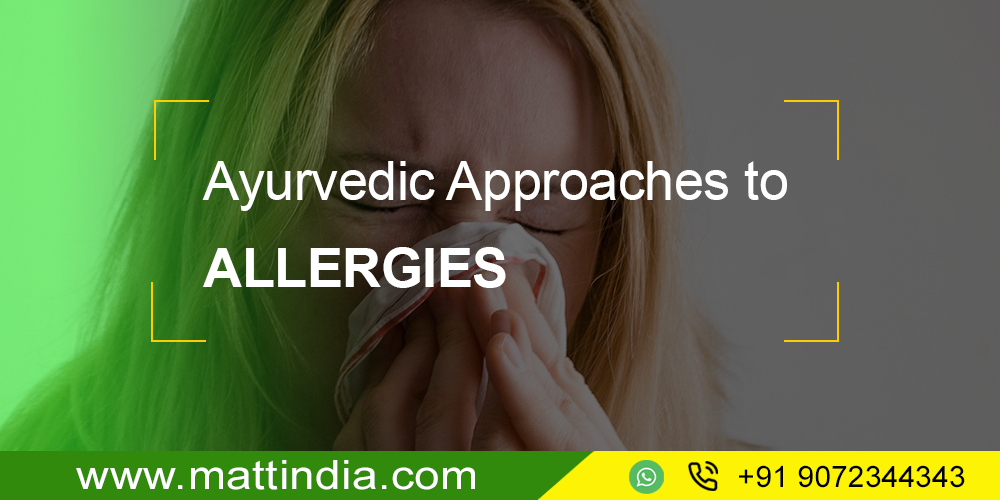The allergies are the main issue people face in our society and they have no other option rather to accept the fate and ease their symptoms with medications. Ayurveda acknowledges allergies and explains as a result of a sedentary lifestyle.
The therapeutic measures differ from the western medicine. We all look forward to the warm season, while others have mixed feelings about the upcoming months as the spring awakens the rise of pollen in the air.
Many people get running nose, sneezing and swollen eyes during cold seasons. Allergies can be caused in winters besides the pollen allergies. The waiting rooms of allergists and dermatologists occur high during March onwards.
The western medicines considers allergies as hypersensitivities as the immune defence of the body tames a stimulus. The skin, respiratory system and gastrointestinal tract are affected most often.
The allergens stimulate our body during ingestion, touch or the airways. These reactions often follow immediately or can be delayed. The allergic reaction is a combination of environmental factors, genetics and a frequent exposition to the allergen.
Ayurveda identifies different medical parameters that lead hypersensitivity besides acknowledging allergies. The concept of tolerance also called as Satmya, where the individual tolerance on external influences depends on the dosha as well on familiarization. The latter are strengthened by a higher consumption.
The indigestion or ajirna is an unsuitable diet that depends on the dosha caused by late meals, irregular food intake, cold or raw ingredients leading to a weakened digestive fire (Agni). The toxins block the intestinal wall by disturbing the intestines immune process.
The blood irritation can be called as Raktadushti where there is a high consumption of oily, salty, acidic and spicy food. The suppressed emotions or long sunbathing irritates the blood that favours allergies.
The increase of Pitta, Vata and Kapha are called Doshavriddhi. Allergies are partially caused by dosha imbalances. Mainly the allergic reaction depends on the dominating dosha.
The air component Vata increases leading to breathing difficulties, sneezing spells, and itching due to thin and dry mucus. The fire element Pitta is the dominating dosha, reddened skin or inflammations like conjunctivitis are the most common symptoms.
The high Kapha dosha is the element of earth and water causing swelling and mucus production. Ayurveda normally follows a holistic approach, mind and body as intact and in balance, preventing allergies or hypersensitivities from occurring.
The anatomic preconditions such as the healthy mucous membranes of airways and the digestive tract along with a healthy skin barrier. The successful stress management must not be neglected in accord to psychological factor.
Ayurveda combines with five different therapy approaches to treat allergic diseases:
The Diet plan or Ahara
The individual diet plan along with ayurvedic physician is tailor-made to the individual lifestyle and body constitution that serves the perfect base for balancing the doshas and preventing allergies. The following tips are:
- Steaming is good than frying or roasting.
- The consumption of red meat and alcohol must be avoided.
- Avoid mixing milk with acidic foods like fish, meat and fruits.
- Consume 1.5 litres of unsweetened herbal tea or water every
day.
The Regulatory therapy or Vihara
The high impact of an immune system depends on the personal lifestyle. That is why people suffering from allergies must adapt a routine:
- The patients exhibiting hay fever can start their day with a nasal rinsing and protect the mucous membranes with application of special oils.
- It takes enough regeneration breaks during the day, as the immune defense system requires loads of stress and energy that have a negative influence on this.
- You have to pay attention to the sleep requirements based on your dosha and follow the guidelines. Vata people require more sleep while Kapha needs less sleep and they wake up early.
The natural medicine or Aushadha
The ayurvedic medicinal plants relieves the symptoms. Usually an ayurvedic physician advises you on this regard.
Detoxification or Shodhana
The fivefold detoxification is also known as Panchakarma. An experienced Ayurvedic physician decides which cleaning procedures are applicable for a specific health problem.
Psychosomatic medicine or Sattvavajaya
The allergic problems are caused by a person’s state-of-mind. There are psychological aspects like insecurity and anxiety that requires special attention. Mental stability and inner peace reduces the allergic reactions.
Ayurveda may not offer an instant solution for hypersensitivity but it reduces the symptoms.








